Report of the Month
Freiburg, Dec 18, 2017
The University of Freiburg has a great deal to be proud of as the year draws to a close: pioneering research, decisive changes in higher education policy, contributions to public debate and cultural life, demonstrations against "fake news," and protests in Hawaiian shirts. This month-by-month review takes a look back at the reports that made the biggest splash with readers of the online-magazine and in the media in 2017.
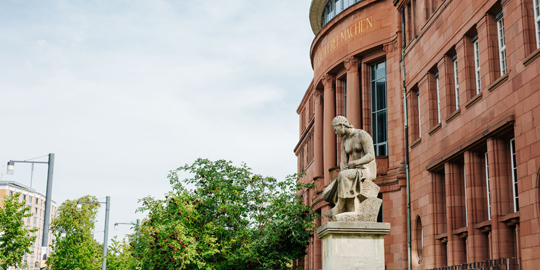
Photo: Sandra Meyndt
January
New ideas were ushered in 2017. In his New Year's speech, Freiburg University Rector Prof. Dr. Hans-Jochen Schiewer reviewed the achievements of the past year and looked forward at how to face the challenges of the one ahead.
February
Geologist Dr. Michael Poelchau, went on an expedition to the Chicxulub crater, which is located in Mexico's Yucatán region. Created by an asteroid strike 66 million years ago, the crater is 180 kilometers in diameter. At the time, the catastrophic event wiped out 75 percent of all the animals and plants on earth. Poelchau spent six weeks on board a ship and examined the drill corings brought to the surface from 500 meters to 1,335 meters below the seabed.
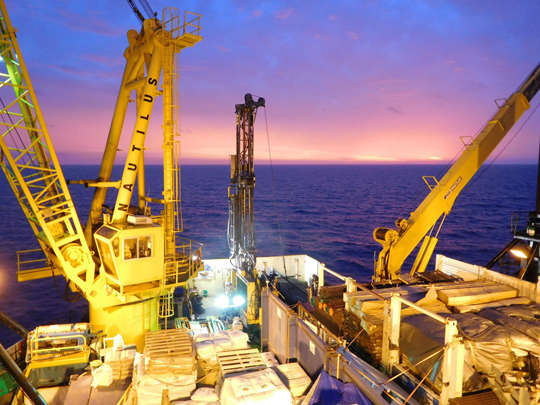
Sunrise: The team spent several months on a drilling platform. Photo: ECORD IODP
March
Mick, Keith, Ronnie and Charlie are rocking Freiburg. The Center for Popular Culture and Music ("Zentrum für Populäre Kultur und Musik" (ZKPM) has received a unique collection. The "Reinhold Karpp Rolling Stones Collection" includes more than 15 thousand recordings and a large number of books, newspaper clippings, fan mail and merchandise – from baseball caps, to toys, watches, and telephone cards. There's even a pinball machine to see.

A lot of tongue: The collection contains a large amount of fan merchandise. Photo: Max Orlich
April
Researchers at the University of Freiburg took to the streets to demonstrate against the cabinet of US President Donald Trump adopting policies based on "alternative facts." On 22 April 2017, the researchers joined the international "March for Science." A doctoral candidate in political science, Ingo Henneberg, was one of the organizers of the demonstration in Freiburg. The 2,500 people who took part made it one of the biggest of the day in Germany.
May
The acronym "RMTMO RI" admittedly sounds cryptic, but it signifies an enormous success for the European Campus. The monitoring committee of the Interreg V Oberrhein program approved nearly 950 thousand euros in funding for the large-scale research infrastructure project "RMTMO RI – Stärkung der Forschungsinfrastruktur in der Metropolregion Oberrhein (Strengthening research infrastructure in the Upper Rhine Metropolitan region)". The aim of the program is to develop a concept for locating innovative, transboundary research infrastructure to strengthen the Upper Rhine academic and scientific region.
June
There were two media highlights in June. During 2017, three legislative initiatives were introduced that would greatly expand the admissibility of additional methods of DNA analysis in criminal investigation. Working with an interdisciplinary group, sisters Prof. Dr. Anna Lipphardt and Prof. Dr. Veronika Lipphardt jointly published position papers that demonstrate that the promise of these methods has been overestimated, and while underestimating the risks. The two researchers warned, "We could all become suspects."
A member of the Department of German's library staff, Rainer Dausch, is campaigning to have the academic year scheduled differently. If lecture periods for the spring semester were held from the start of February to the end of May, students, teachers, researchers and staff would be spared working in the heat of the summer. To make his point, he wore a Hawaiian shirt every day of the hottest season.
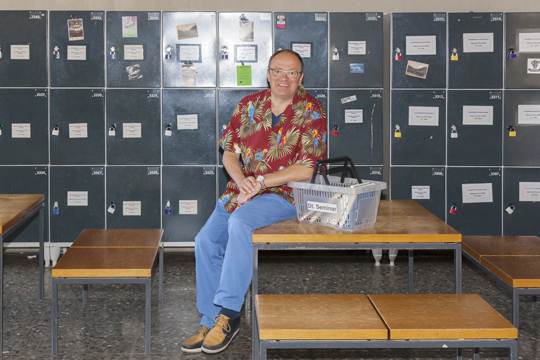
Summer arrived in the German Department and Rainer Dausch donned a Hawaiian shirt daily. Photo: Ingeborg F. Lehmann
July
Prof. Dr. Andreas Barner is an alumnus of the University of Freiburg, chairman of the University Council, and president of the Stifterverband für die Deutsche Wissenschaft (an organization that promotes and supports science and technical research in higher education). That gives him three different perspectives on the institution. In July, he gave a speech on the challenges of higher education policy with respect to the "Excellence Strategy" and the "Promoting Young Researchers Program."
August
August also saw two high-profile events. Biology professor Andrew Straw built something like the holodeck that can be seen on the television series, Star Trek. The holodeck is a space that can simulate any desired virtual world. Such an environment allows experiments to be carried out that are not possible in the real world, for example, the movement of a creature can be decoupled from its perception in order to investigate its spatial cognition. The team has demonstrated that flies, fish, and mice perceive the simulated objects as genuine and change their behavior in different visual surroundings.
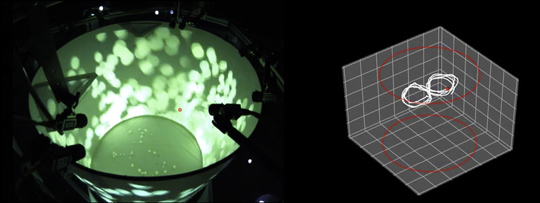
Researchers monitor the position of a fly (red circle) and the direction of its flight with enhanced visual stimulation. Left: Recording live, right: plotting flight position. Photo: https://strawlab.org/freemovr
Freiburg's renewed Old Synagogue Square (Platz der Alten Synagogue) was opened in August. During the last decade, a great deal has been said about the site's design, significance ,and name. In an interview, Dr. Heinrich Schwendemann, a historian, explained how developments on the site unfolded in the past and spoke about the meaning the square will have for the city of Freiburg in the future. He said that the site's dignity must be protected.
September
Two news reports received a great deal of attention in September, as well. The University of Freiburg achieved significant success in the ongoing excellence competition among "clusters of excellence." Two of the university's outstanding research institutions were invited to submit full funding proposals. The "CIBSS – Centre for Integrative Biological Signalling Studies" and "Living, Adaptive and Energy-autonomous Materials Systems (livMatS)" systems moved into the second round of the competition. The researchers have until 21 February 2018 to submit full funding applications.
And whether they had a smartphone, tablet or a PC, the Debat-O-Meter allowed people to evaluate live television debates between politicians from the comfort of their own homes. A team working with political scientist Prof. Dr. Uwe Wagschal and computer scientist Prof. Dr. Bernd Becker, both of the University of Freiburg, developed the app. They also employed it to get feedback on the most significant debates ahead of elections in 2017 in the German states of Schleswig-Holstein, North Rhine-Westfalia, the Saarland and for federal parliamentary elections as well.
October
October also featured two media highlights. To mark the centennial of the Russian revolution, the university held Russian Culture Days, a series of events aimed at inspiring people to think about the political, socio-economic, and cultural impact of the historic upheaval. Founded in May by the city of Freiburg and the university jointly, the Zwetajewa Center for Russian Culture presented a seven-week program of events from the worlds of academia, music, art, film, literature, and theater in October and November.
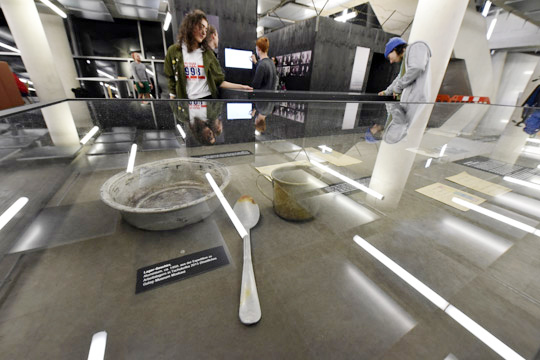
An exhibition about the gulag can be seen in the University Library until February 2018. Photo: Thomas Kunz
"Due to their transgressions in the time of National Socialism, the Senate dissociates itself from the appointment of the following persons as honorary senators: Wilhelm Frick, Karl Gärtner, Werner Haustein, Franz Kerber, Franz Xaver Rappenecker, and Emil Tscheulin," says a unanimous decision of the Senate of the University of Freiburg. A comprehensive historical reappraisal of the appointments came ahead of the vote. A group of experts evaluated information about all those who had been named honorary senators of the university since 1922 after allegations against individual appointees emerged. Special criteria for the process were developed and established ahead of the assessment.
November
Solar cells, LEDs, and microchips are just a few modern technologies that require high-quality crystals. They are composed of a crystalline, molten mass that can be made by melting silicon and germanium, for example. But gravity affects the substance, resulting in a loss in crystal quality. In an effort to grow the perfect crystal, Dr. Tina Sorgenfrei and her team have been using parabolic flights to simulate weightlessness.
December
And although December has yet to come to a close, a "report of the month" is already emerging. More than five million Germans left their country and went to North America in the 19th century. Geography professor Dr. Rüdiger Glaser has published a study that shows the people were not just fleeing from poverty, war, and revolution. Glaser and his team have also shown that up to 30 percent of the migration could be attributed to climatic extremes.

